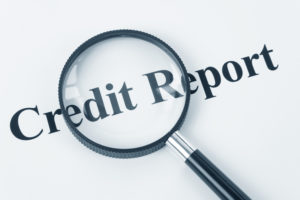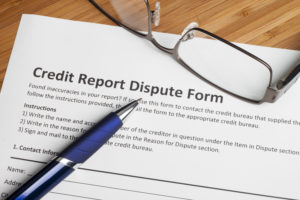Contents
- MICHIGAN CHAPTER 7 & CHAPTER 13 BANKRUPTCY: POST-DISCHARGE CREDIT REPORTING
- MICHIGAN CHAPTER 7 & CHAPTER 13 BANKRUPTCY & THE FAIR CREDIT REPORTING ACT (FCRA)
- POST-BANKRUPTCY DISCHARGE CREDIT REPORTING: WHEN THE BANKRUPTCY CODE CAN HELP
- POST-BANKRUPTCY DISCHARGE CREDIT-REPAIR SERVICES: BUYER BEWARE
- POST-BANKRUPTCY DISCHARGE CREDIT REPORTING: THE BOTTOM LINE
MICHIGAN CHAPTER 7 & CHAPTER 13 BANKRUPTCY: POST-DISCHARGE CREDIT REPORTING
The legislative purpose of Chapter 7 and Chapter 13 bankruptcy is to give an honest debtor a fresh start. However, what does and does not constitute a “fresh start” is unfortunately often governed by what a privately compiled collection of data about that debtor’s finances and financial history has to say to anyone viewing.
This collection of data is, of course, your credit report. Or, more accurately, reports in the plural as there are 3 main collectors and publishers of personal credit and financial history, each publishing their own credit report.
These publishers are well known: TransUnion, Equifax, and Experian.

Federal law provides that each of the three credit reporting bureaus must provide a free copy of a person’s credit report annually.
They are not governmental agencies. They do not operate with any Federal charter. They are functions of private enterprise. And yet the “score” they calculate based on an arcane mathematical formula that each company utilizes and maintains as a trade secret can be the be-all and end-all as to whether we are able to buy a car at a non-usurious interest rate, rent an apartment, obtain a mortgage, and, here in Michigan, even obtain affordable automobile insurance.
When the data that they collect on each of us is less than accurate, that can and does stymie the public “fresh start” function of the Chapter 7 and Chapter 13 bankruptcy process.
What can be done about it? And by whom?
MICHIGAN CHAPTER 7 & CHAPTER 13 BANKRUPTCY & THE FAIR CREDIT REPORTING ACT (FCRA)
After a Chapter 7 or Chapter 13 bankruptcy discharge, the holders or servicers of debt discharged in the bankruptcy generally must report the debt as no longer owing or owed to the 3 credit bureaus listed above.
This does not happen instantaneously. Post-discharge bankruptcy filers who religiously haunt Credit Karma on a minute by minute basis the moment they receive the Bankruptcy Court’s Notice of Discharge in the mail are not making the best use of their free time.
We advise that our clients wait approximately 6 months and then properly request free copies of all 3 bureaus’ credit reports via annualcreditreport.com.
If a debt that was discharged in the Chapter 7 or Chapter 13 bankruptcy remains listed as owing, owed, delinquent, or past-due (or, worse, referred to collections), the first step is not to call the Michigan bankruptcy attorney who handled your Chapter 7 or Chapter 13 in a panic.
Your first step is governed not by the US Bankruptcy Code and your bankruptcy attorney, but by what is called the Fair Credit Reporting Act (FCRA).
The FCRA is the Federal statute that obligates a creditor to provide accurate credit reporting information to the bureaus and to investigate claims by consumers that the information reported to the bureaus is not accurate.
The first step, therefore, is to simply follow the specific instructions on each bureau’s credit report (yes, you will need to do this 3 times if the same inaccurate information is reported on all 3 credit reports) to file a dispute with the credit bureau.
You will need to provide the bureau, generally, with a copy of your Notice of Chapter 7 or Chapter 13 bankruptcy filing, Notice of Chapter 7 or Chapter 13 discharge, and a copy of the Bankruptcy Petition Schedule listing the debt.
You should recall, also, while doing this, that, while all debts must be listed in your Bankruptcy Petition Schedules, not all debts are dischargeable.
Your student loan debt, for example, will be unaffected by your Chapter 7 or Chapter 13 bankruptcy discharge if you did not proactively file (and win) an “adversary proceeding” lawsuit within your bankruptcy case seeking a ruling that the debt will be discharged.
If that did not happen, your student loan servicers are properly reporting the debt as owed and possibly delinquent, if you are behind on payments.
Short of that, however, if the debt was discharged, you must first and foremost dispute the debt as instructed on each credit report.
This is not something you need your bankruptcy attorney to assist you with. (Particularly given that your retainer agreement with your bankruptcy attorney certainly expired with the issuance of your Notice of Bankruptcy Discharge.) You do not need to pay your bankruptcy attorney hundreds of dollars per hour to deal with this situation in the vast majority of case.
Your bankruptcy attorney is almost certainly under no contractual duty to assist you at this point—and FCRA matters (which are undertaken outside of Bankruptcy Court, in Federal District Court) may not be within the bankruptcy attorney’s scope of practice.
This is something you do directly with the bureaus, on your own. Generally, if you furnish the proper, required documentation and the debt has been legitimately discharged, the FCRA requires that the creditor respond to the dispute with an update of reported information to the credit bureau, correcting the problem.
What if that doesn’t happen?
Be aware that the FCRA does not provide any private cause of action for creditors’ failure to provide accurate information. This means you cannot sue them simply for reporting a discharged debt as being owed.
There is also no private cause of action under the FCRA for a creditor’s failure to undertake a proper investigation of the issue if you report the inaccuracy directly to the creditor rather than via credit bureaus’ dispute reporting processes.
You must file a dispute with the bureaus.

The three major credit reporting bureaus all have an online dispute resolution process to correct any debts which show as outstanding after a bankruptcy discharge has been granted.
The three major credit reporting bureaus all have an online dispute resolution process. Here are the links:
If it doesn’t work, then you may want to consult a consumer attorney with FCRA expertise. This may or may not be the Michigan bankruptcy attorney you used for your Chapter 7 or Chapter 13 bankruptcy proceeding.
POST-BANKRUPTCY DISCHARGE CREDIT REPORTING: WHEN THE BANKRUPTCY CODE CAN HELP
Simultaneously with the FCRA, the Bankruptcy Code can, when the FCRA dispute process fails to resolve the situation, again be helpful—but in limited circumstances.
The Bankruptcy Code will apply when the creditor reporting the inaccurate information is doing so in a malicious and willful manner with the intent to collect a discharged debt in contempt of the Bankruptcy Court’s Order of Discharge.
The burden of proof in establishing that any of that is the case falls upon the debtor.
While there is certainly case-law out there finding creditors liable for violations of the Bankruptcy Court’s “discharge injunction” with regard to credit reporting, it is important to remember that a debtor also has no private cause of action under the Bankruptcy Code for discharge injunction violations.
To obtain relief or sanctions (particularly in the form of a money damages award), the Chapter 7 or Chapter 13 case must first be reopened and then a Motion for Contempt (of the Court’s Order of Discharge) must be brought, alleging and establishing that the violation occurred.
The Court itself holds the right to a cause of action here, not the debtor.
You will want to consult your bankruptcy attorney in this case, for an evaluation of whether a discharge violation has actually occurred and the odds of success with the required motions.
An example of when you would want to consult your bankruptcy attorney was mentioned above: if the reporting creditor is reporting that the claim has been referred or transferred to collections, especially if the collector is actually contacting you.
Note that it is not a violation of either the FCRA or the Bankruptcy Code for a creditor holding discharged debt to sell the note to a debt-buyer or some other third party. What the purchaser gets out of the deal is a mystery, but it is legal and it happens.
POST-BANKRUPTCY DISCHARGE CREDIT-REPAIR SERVICES: BUYER BEWARE
Finally, be aware, that consulting a so-called “credit repair service,” especially one that charges you a fee, is likely to get you nowhere.
You cannot dispute with long-term success negative information that is accurate, and the provisions of the FCRA do not apply to credit repair services unless they are legitimate non-profit organizations.
The State of Michigan, further, has very stringent regulations as to how much and when such (alleged) services can charge you any fee at all.
If you are paying someone—especially if the prior resume of the person includes areas of expertise such as landscaping services or hair-styling—to “repair” your credit, you are very likely engaging a fraudulent and illegal enterprise.
POST-BANKRUPTCY DISCHARGE CREDIT REPORTING: THE BOTTOM LINE
The bottom line is that the credit bureaus’ dispute process is your first step before calling anybody else.
If a creditor whose debt has been discharged in your Chapter 7 or Chapter 13 bankruptcy, or someone to whom that creditor has assigned or sold the debt, is actively contacting or attempting to collect from you, call your bankruptcy attorney.
If your dispute has not resulted in corrected reporting but nothing else is happening, you may need to consult legal counsel regarding your options under the Fair Credit Reporting Act.
Attorney Walter Metzen is a Board Certified Bankruptcy expert and has assisted thousands of consumers with Chapter 7 and Chapter 13 bankruptcy filings in metro Detroit.
The Law Offices of Walter A. Metzen & Associates offers free consultations for those interested in the bankruptcy process and is experienced in determining and advising as to the best course of action when filing Chapter 7 or Chapter 13.




